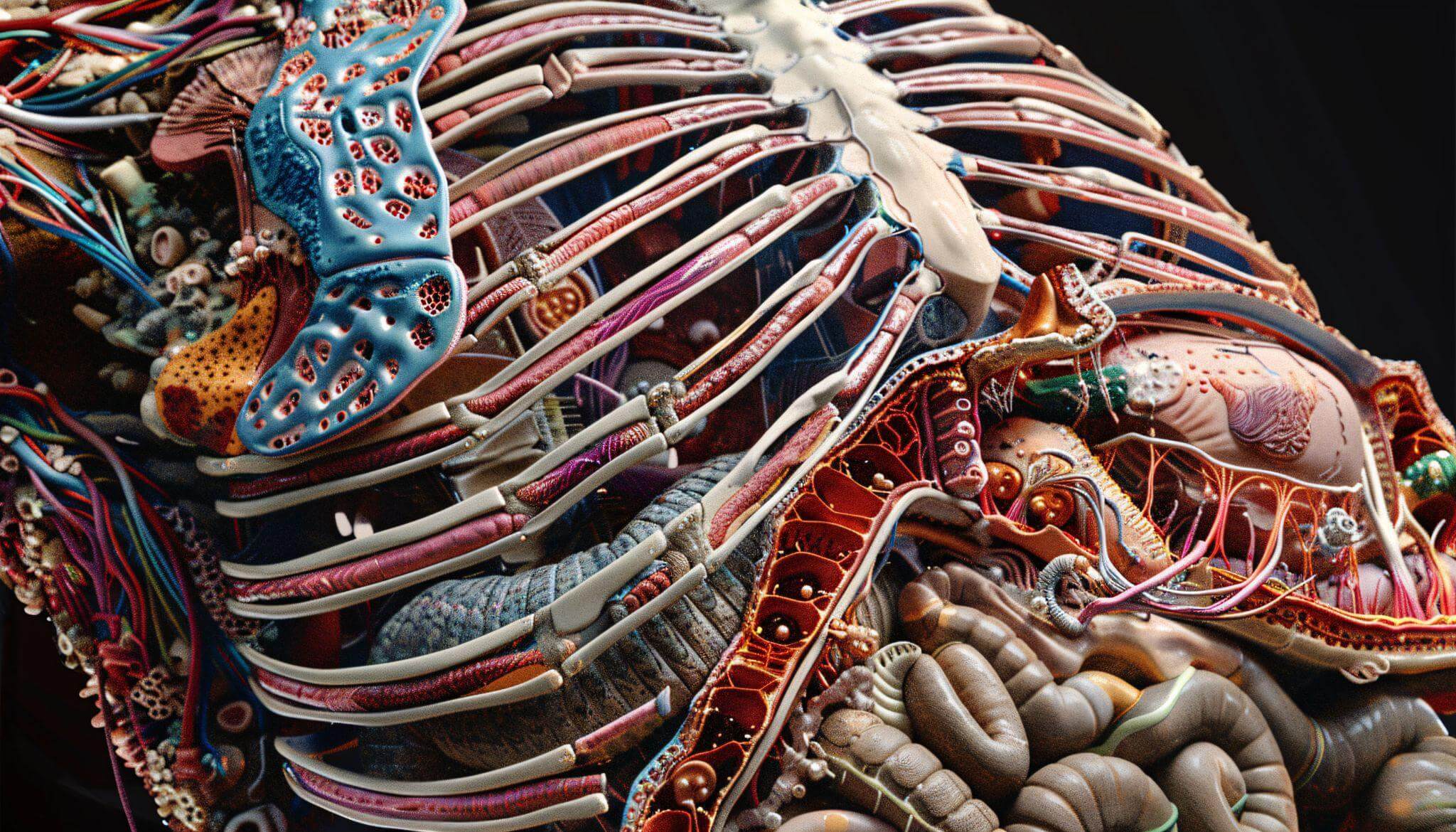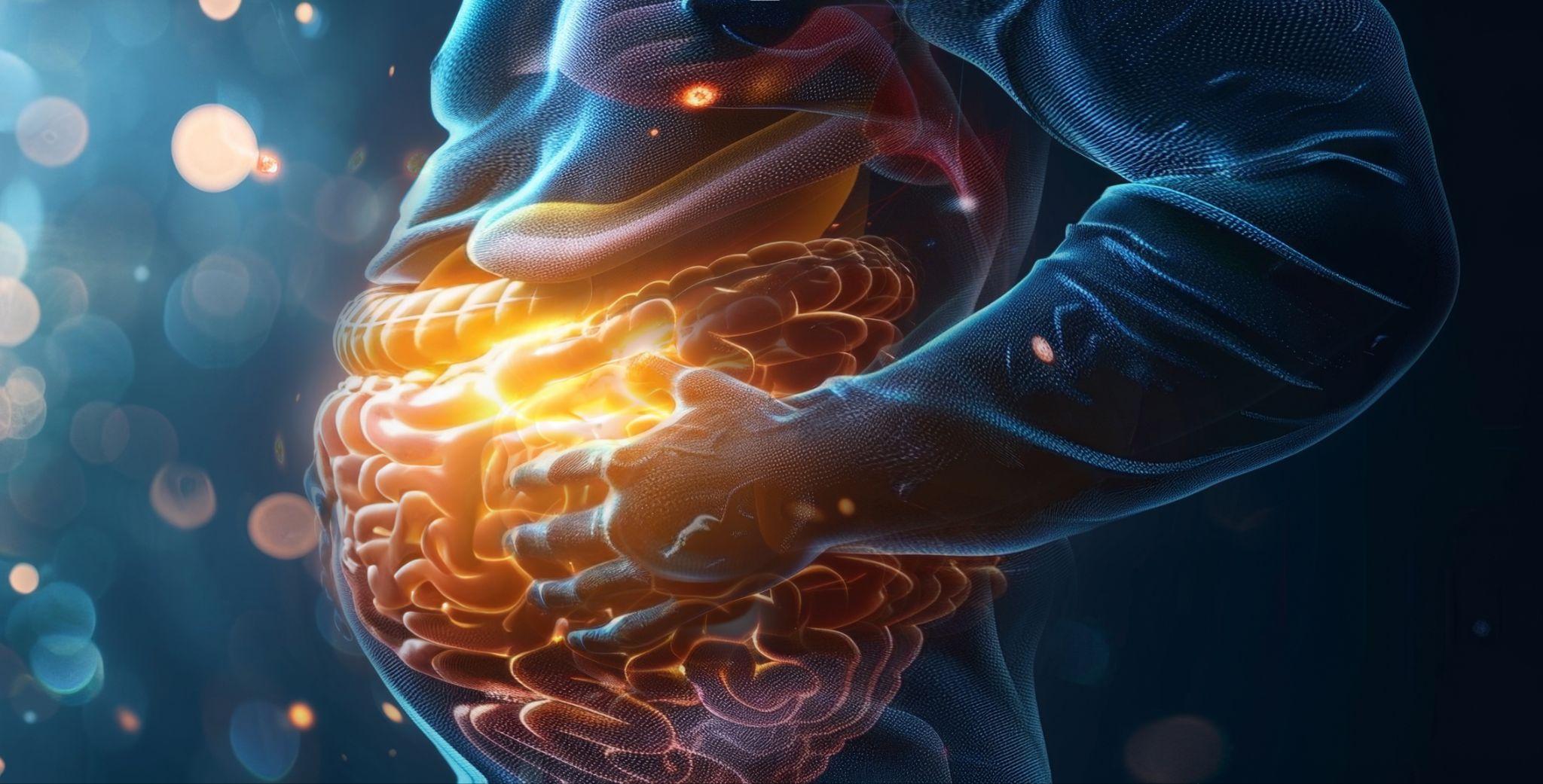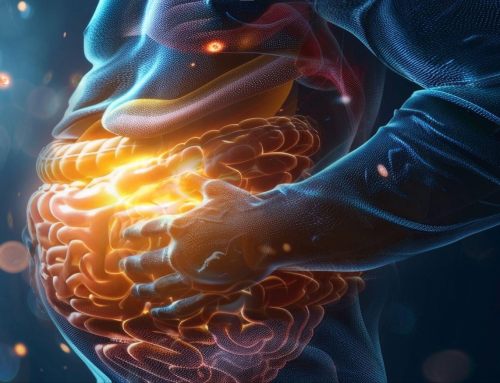The Digestive Supersystem: Nervous, Endocrine, Immune, and Hepatobiliary System Interactions
Understanding the intricate interactions between various physiological systems is paramount for comprehending the root cause of health issues and devising effective treatment strategies. Much like a highway system engineered to allow multi-directional travel carrying goods and services, information, and waste between suburban neighborhoods and a central city hub, the digestive system relies on interactions with the nervous, endocrine, immune, and hepatobiliary systems to create a digestive supersystem (1).
A complex communication network utilizing biochemical agents, electrical signaling, and molecular messaging throughout the digestion supersystem supports the body in optimally digesting food, absorbing and assimilating nutrients, protecting against pathogens, and detoxifying harmful substances. When one or more peripheral systems experience dysfunction, digestion suffers, and gastrointestinal (GI) disorder symptoms may present in a patient in days, weeks, months, or even years after the complementary system breaks down (2). Disruptions in the balance of the GI microbiome are common occurrences when the digestive supersystem does not function as it should and fails to properly host the symbiotic species residing in the gut (3).
Effective clinical management of upper- and lower-GI dysfunction entails symptom recognition beyond the intestinal manifestations of diarrhea and constipation commonly reported in cases of irritable bowel disease (4). Detailed patient history-taking, including dietary habits, lifestyle factors, medication use, past medical history, and family history of GI disorders and related peripheral system signs, provides valuable insights into potential triggers and predisposing factors. Symptom analysis, including the nature, severity, duration, and timing of GI symptoms such as abdominal pain, bloating, diarrhea, constipation, reflux, and changes in bowel habits, helps elucidate the underlying pathology. When possible, a thorough physical examination focusing on abdominal assessment, looking for tenderness, distension, organomegaly, and abnormal bowel sounds, provides additional diagnostic clues. Examination of extra-abdominal signs, such as oral ulcers (5), dermatological manifestations (6), and signs of nutritional deficiencies (7), may also be informative in certain GI disorders. A keen eye for signs and symptoms along the side roads of the digestive supersystem highway will lead providers to root cause solutions and a holistic treatment approach to GI disease.
Many Roads Lead to the Digestion Supersystem Highway
Nervous System Interaction: The digestive system maintains close communication with the nervous system, locally and centrally, to regulate digestive processes.
- The enteric nervous system (ENS), often referred to as the “second brain,” is a complex network of neurons within the digestive tract that locally regulates various digestive functions independently of the central nervous system (CNS) (8). However, the CNS significantly influences the ENS through the Sympathetic and Parasympathetic nerve branches. At the same time, the GI microbiome plays a role in the development and function of both the ENS and CNS (9).
- Centrally, the CNS regulates the secretion of digestive juices, controls peristalsis, and triggers the release of hormones that affect digestion and absorption (10).
- Dysregulation in the autonomic nervous system (ANS), often due to chronic stress or autonomic dysfunction, can lead to altered gastrointestinal motility, visceral hypersensitivity, and increased gut permeability, contributing to digestive disorders like irritable bowel syndrome (IBS) and functional dyspepsia (10).
Endocrine System Interaction: Hormonal signaling from various endocrine glands, such as the stomach, pancreas, and small intestine, acts on target cells within the digestive tract to modulate digestive functions.
- The hormones gastrin, secretin, cholecystokinin (CCK), ghrelin, and insulin are intricately involved in regulating gastric acid secretion, pancreatic enzyme release, bile production and release, appetite stimulation, and glucose metabolism, respectively (11).
- Dysregulation in these hormonal pathways (often influenced by dietary factors, gut microbiota composition, and metabolic imbalances) can lead to metabolic syndrome, obesity, diabetes, gastrointestinal disorders like gastroesophageal reflux disease (GERD), and gallstone formation (11).
Immune System Interaction: The digestive system is routinely exposed to potential pathogens and foreign antigens from food and the environment. The GI tract maintains a delicate balance between immune tolerance and immune defense against pathogens.
- The gut-associated lymphoid tissue (GALT), including Peyer’s patches and lymphoid follicles in the intestines, and the mucosal-associated lymphoid tissue (MALT) of the gastrointestinal endothelium, serve as crucial sites for immune surveillance and response within the digestive tract (12).
- Disruptions in gut barrier integrity, dysbiosis (imbalance in gut microbiota), and chronic low-grade inflammation can trigger immune-mediated disorders like inflammatory bowel disease (IBD), celiac disease, and food sensitivities (13).
- Immune cells such as macrophages, dendritic cells, and lymphocytes are present throughout the digestive system to detect and neutralize pathogens, preventing infections and maintaining gut homeostasis (14).
Hepatobiliary System Interaction: Comprised of the liver, gallbladder, and bile ducting pathways, the hepatobiliary system plays essential roles in digestion, nutrient absorption, metabolic regulation, and detoxification.
- The liver synthesizes bile to be stored and concentrated in the gallbladder. Upon release into the small intestine, bile becomes crucial for lipid digestion, fatty acid and fat-soluble vitamin absorption, and detoxifying harmful substances (15).
- Disruptions in hepatic bile synthesis, intestinal peristalsis and permeability, and mucosal receptor activity can affect the quantity and quality of bile acids, increasing the risk of extrahepatic pathologies (16).
- Dysfunction in the hepatobiliary system, often linked to poor dietary choices, excess alcohol consumption, toxin exposure, and metabolic disorders, can lead to impaired bile flow, gallstone formation, non-alcoholic fatty liver disease (NAFLD), and dysregulated lipid metabolism (17).
Understanding these intricate subsystem interactions with the digestive system allows clinicians to adopt a functional approach to assessing and addressing digestive health issues. By addressing underlying factors such as diet, lifestyle, stress management, gut microbiota balance, and metabolic health, they can promote optimal digestive function and overall well-being in their patients.
Repairing Significant Problems Generated by Digestive Supersystem Dysfunction
Advances in microbiome understanding have revolutionized assessing and managing upper- and lower-GI system disorders. Here’s how.
Upper Gastrointestinal Disorders:
Gastric Ulcers and Helicobacter pylori (H. pylori) Infection: The discovery of H. pylori as a causative factor in gastric ulcers led to targeted antibiotic therapies drastically improving treatment outcomes (18). Understanding the role of hypochlorhydria and gut microbiome imbalance in modulating H. pylori colonization and gastric mucosal inflammation has spurred research into betaine hydrochloride and probiotics as adjunctive therapies to enhance H. pylori eradication rates and promote mucosal healing (19).
Gastroesophageal Reflux Disease (GERD): Dysbiosis is implicated in the pathogenesis of GERD. Probiotics and dietary interventions to restore microbial balance and improve gut barrier function have shown promise in alleviating GERD symptoms and reducing esophageal inflammation (20).
Lower Gastrointestinal Disorders:
Inflammatory Bowel Disease (IBD): The gut microbiome plays a critical role in the pathogenesis and progression of IBD, with dysbiosis implicated in immune dysregulation and chronic intestinal inflammation. Personalized microbiome profiling and metagenomic analysis have provided insights into microbial signatures associated with IBD subtypes, allowing for more targeted therapeutic interventions. Fecal microbiota transplantation (FMT), a procedure aimed at restoring gut microbial balance, has emerged as a promising therapy for select patients with refractory IBD, particularly recurrent Clostridioides difficile infection and ulcerative colitis (21).
Irritable Bowel Syndrome (IBS): Alterations in gut microbiota composition and function have been observed in individuals with IBS, contributing to gastrointestinal symptoms such as abdominal pain, bloating, and altered bowel habits (22). Probiotics, prebiotics, and dietary modifications targeting the gut microbiome have effectively alleviated IBS symptoms and improved quality of life (23). Advancements in microbial-based diagnostics, including breath tests and stool analysis, have facilitated the identification of specific microbial biomarkers associated with IBS subtypes, enabling more personalized treatment approaches (22, 23, 24).
Colorectal Cancer (CRC): Dysbiosis and microbial dysregulation have been implicated in colorectal carcinogenesis, influencing tumor initiation, progression, and response to therapy (25). Strategies aimed at modulating the gut microbiome, such as dietary interventions, probiotics, and FMT, hold the potential for mitigating CRC risk and improving treatment outcomes. Microbiome-based biomarkers may serve as diagnostic and prognostic indicators for CRC, guiding therapeutic decision-making and surveillance strategies (26).
Advances in microbiome research have provided unprecedented insights into the pathogenesis and management of upper and lower GI disorders. By leveraging this knowledge, clinicians can implement targeted interventions to restore microbial balance, alleviate symptoms, and improve outcomes for patients with GI conditions.
Functional Assessment Tools for Locating the Problems
Functional Laboratory Testing assesses various aspects of GI function:
- Comprehensive stool analysis to evaluate microbial balance, digestive enzyme activity, inflammation markers, and occult blood (27).
- Breath tests for detecting small intestinal bacterial overgrowth (SIBO), lactose intolerance, and other malabsorption syndromes (28).
- Food sensitivity testing to identify potential triggers of immune-mediated reactions and gut inflammation (29).
- Comprehensive metabolic panels to assess nutritional status, liver function, and metabolic imbalances (30).
- Genetic testing to identify genetic predispositions and susceptibilities to GI disorders, such as celiac disease and hereditary colorectal cancer syndromes (31).
Imaging Studies:
- Imaging modalities such as abdominal ultrasound, computed tomography (CT), magnetic resonance imaging (MRI), and endoscopic procedures (esophagogastroduodenoscopy, colonoscopy) may be utilized to visualize structural abnormalities, mucosal lesions, strictures, and tumors (32).
- Capsule endoscopy and double-contrast barium studies are used for evaluating small bowel pathology not readily visualized by conventional endoscopy (33).
Microbiome Analysis:
- Microbiome analysis utilizing next-generation sequencing techniques provides insights into the gut microbiota’s composition, diversity, and functional capacity. Microbiome testing aids in identifying dysbiosis, microbial imbalances, and potential microbial contributors to GI disorders, guiding targeted interventions such as probiotics, prebiotics, and dietary modifications (34).
When the digestive supersystem highway degrades beyond the capacity of nutritional intervention to repair the communication processes, integrating these assessment techniques can help clinicians understand the underlying factors contributing to GI disorders, facilitating individualized treatment plans to restore gut health and promote overall well-being.
**
Are you interested in learning more about the latest research on functional medicine tools for managing GI disorders? Join PLMI as we learn from the leading experts on this critical topic during the first of a two-part, free, live, virtual webinar “Advances in the Management of Gastrointestinal Disorders: Upper and Lower GI Issues and their Relationship to the Microbiome.” Part 1 will be held on March 19, 2024, from 5-7 pm PST and Part 2 on March 26, 2024, from 5-7 pm PST. Registration is FREE and takes just a minute using the following links: Register for Part 1 and Register for Part 2
Sources:
- Yoo BB, Mazmanian SK. The Enteric Network: Interactions between the Immune and Nervous Systems of the Gut. Immunity. 2017 Jun 20;46(6):910-926. doi: 10.1016/j.immuni.2017.05.011. PMID: 28636959; PMCID: PMC5551410.
- Nóbrega VG, Silva INN, Brito BS, Silva J, Silva MCMD, Santana GO. THE ONSET OF CLINICAL MANIFESTATIONS IN INFLAMMATORY BOWEL DISEASE PATIENTS. Arq Gastroenterol. 2018 Jul-Sep;55(3):290-295. doi: 10.1590/S0004-2803.201800000-73. PMID: 30540094.
- Hillestad EMR, van der Meeren A, Nagaraja BH, Bjørsvik BR, Haleem N, Benitez-Paez A, Sanz Y, Hausken T, Lied GA, Lundervold A, Berentsen B. Gut bless you: The microbiota-gut-brain axis in irritable bowel syndrome. World J Gastroenterol. 2022 Jan 28;28(4):412-431. doi: 10.3748/wjg.v28.i4.412. PMID: 35125827; PMCID: PMC8790555.
- Greuter T, Vavricka SR. Extraintestinal manifestations in inflammatory bowel disease – epidemiology, genetics, and pathogenesis. Expert Rev Gastroenterol Hepatol. 2019 Apr;13(4):307-317. doi: 10.1080/17474124.2019.1574569. Epub 2019 Feb 20. PMID: 30791773.
- Muhvić-Urek M, Tomac-Stojmenović M, Mijandrušić-Sinčić B. Oral pathology in inflammatory bowel disease. World J Gastroenterol. 2016 Jul 7;22(25):5655-67. doi: 10.3748/wjg.v22.i25.5655. PMID: 27433081; PMCID: PMC4932203.
- Moniaga CS, Tominaga M, Takamori K. An Altered Skin and Gut Microbiota Are Involved in the Modulation of Itch in Atopic Dermatitis. Cells. 2022 Dec 5;11(23):3930. doi: 10.3390/cells11233930. PMID: 36497188; PMCID: PMC9736894.
- Massironi S, Rossi RE, Cavalcoli FA, Della Valle S, Fraquelli M, Conte D. Nutritional deficiencies in inflammatory bowel disease: therapeutic approaches. Clin Nutr. 2013 Dec;32(6):904-10. doi: 10.1016/j.clnu.2013.03.020. Epub 2013 Apr 6. PMID: 23602613.
- Yoo BB, Mazmanian SK. The Enteric Network: Interactions between the Immune and Nervous Systems of the Gut. Immunity. 2017 Jun 20;46(6):910-926. doi: 10.1016/j.immuni.2017.05.011. PMID: 28636959; PMCID: PMC5551410.
- Heiss CN, Olofsson LE. The role of the gut microbiota in development, function and disorders of the central nervous system and the enteric nervous system. J Neuroendocrinol. 2019 May;31(5):e12684. doi: 10.1111/jne.12684. Epub 2019 Feb 1. PMID: 30614568.
- Ding JH, Jin Z, Yang XX, Lou J, Shan WX, Hu YX, Du Q, Liao QS, Xie R, Xu JY. Role of gut microbiota via the gut-liver-brain axis in digestive diseases. World J Gastroenterol. 2020 Oct 28;26(40):6141-6162. doi: 10.3748/wjg.v26.i40.6141. PMID: 33177790; PMCID: PMC7596643.
- Ye L, Liddle RA. Gastrointestinal hormones and the gut connectome. Curr Opin Endocrinol Diabetes Obes. 2017 Feb;24(1):9-14. doi: 10.1097/MED.0000000000000299. PMID: 27820704; PMCID: PMC5815400.
- Vighi G, Marcucci F, Sensi L, Di Cara G, Frati F. Allergy and the gastrointestinal system. Clin Exp Immunol. 2008 Sep;153 Suppl 1(Suppl 1):3-6. doi: 10.1111/j.1365-2249.2008.03713.x. PMID: 18721321; PMCID: PMC2515351.
- Sugihara K, Kamada N. Diet-Microbiota Interactions in Inflammatory Bowel Disease. Nutrients. 2021 May 1;13(5):1533. doi: 10.3390/nu13051533. PMID: 34062869; PMCID: PMC8147260.
- Montalvillo E, Garrote JA, Bernardo D, Arranz E. Innate lymphoid cells and natural killer T cells in the gastrointestinal tract immune system. Rev Esp Enferm Dig. 2014 May;106(5):334-45. PMID: 25287236.
- Boyer JL. Bile formation and secretion. Compr Physiol. 2013 Jul;3(3):1035-78. doi: 10.1002/cphy.c120027. PMID: 23897680; PMCID: PMC4091928.
- Shulpekova Y, Zharkova M, Tkachenko P, Tikhonov I, Stepanov A, Synitsyna A, Izotov A, Butkova T, Shulpekova N, Lapina N, Nechaev V, Kardasheva S, Okhlobystin A, Ivashkin V. The Role of Bile Acids in the Human Body and in the Development of Diseases. Molecules. 2022 May 25;27(11):3401. doi: 10.3390/molecules27113401. PMID: 35684337; PMCID: PMC9182388.
- Cai J, Rimal B, Jiang C, Chiang JYL, Patterson AD. Bile acid metabolism and signaling, the microbiota, and metabolic disease. Pharmacol Ther. 2022 Sep;237:108238. doi: 10.1016/j.pharmthera.2022.108238. Epub 2022 Jul 2. PMID: 35792223.
- Rokkas T, Gisbert JP, Malfertheiner P, Niv Y, Gasbarrini A, Leja M, Megraud F, O’Morain C, Graham DY. Comparative Effectiveness of Multiple Different First-Line Treatment Regimens for Helicobacter pylori Infection: A Network Meta-analysis. Gastroenterology. 2021 Aug;161(2):495-507.e4. doi: 10.1053/j.gastro.2021.04.012. Epub 2021 Apr 8. PMID: 33839101.
- Huang R, Wu F, Zhou Q, Wei W, Yue J, Xiao B, Luo Z. Lactobacillus and intestinal diseases: Mechanisms of action and clinical applications. Microbiol Res. 2022 Jul;260:127019. doi: 10.1016/j.micres.2022.127019. Epub 2022 Apr 9. PMID: 35421680.
- Cheng J, Ouwehand AC. Gastroesophageal Reflux Disease and Probiotics: A Systematic Review. Nutrients. 2020 Jan 2;12(1):132. doi: 10.3390/nu12010132. PMID: 31906573; PMCID: PMC7019778.
- Haneishi Y, Furuya Y, Hasegawa M, Picarelli A, Rossi M, Miyamoto J. Inflammatory Bowel Diseases and Gut Microbiota. Int J Mol Sci. 2023 Feb 14;24(4):3817. doi: 10.3390/ijms24043817. PMID: 36835245; PMCID: PMC9958622.
- Enck P, Aziz Q, Barbara G, Farmer AD, Fukudo S, Mayer EA, Niesler B, Quigley EM, Rajilić-Stojanović M, Schemann M, Schwille-Kiuntke J, Simren M, Zipfel S, Spiller RC. Irritable bowel syndrome. Nat Rev Dis Primers. 2016 Mar 24;2:16014. doi: 10.1038/nrdp.2016.14. PMID: 27159638; PMCID: PMC5001845.
- Takakura W, Pimentel M. Small Intestinal Bacterial Overgrowth and Irritable Bowel Syndrome – An Update. Front Psychiatry. 2020 Jul 10;11:664. doi: 10.3389/fpsyt.2020.00664. PMID: 32754068; PMCID: PMC7366247.
- Di Rosa C, Altomare A, Terrigno V, Carbone F, Tack J, Cicala M, Guarino MPL. Constipation-Predominant Irritable Bowel Syndrome (IBS-C): Effects of Different Nutritional Patterns on Intestinal Dysbiosis and Symptoms. Nutrients. 2023 Mar 28;15(7):1647. doi: 10.3390/nu15071647. PMID: 37049488; PMCID: PMC10096616.
- Quaglio AEV, Grillo TG, De Oliveira ECS, Di Stasi LC, Sassaki LY. Gut microbiota, inflammatory bowel disease and colorectal cancer. World J Gastroenterol. 2022 Aug 14;28(30):4053-4060. doi: 10.3748/wjg.v28.i30.4053. PMID: 36157114; PMCID: PMC9403435.
- Fratila TD, Ismaiel A, Dumitrascu DL. Microbiome modulation in the prevention and management of colorectal cancer: a systematic review of clinical interventions. Med Pharm Rep. 2023 Apr;96(2):131-145. doi: 10.15386/mpr-2526. Epub 2023 Apr 27. PMID: 37197270; PMCID: PMC10184528.
- Gallagher K, Catesson A, Griffin JL, Holmes E, Williams HRT. Metabolomic Analysis in Inflammatory Bowel Disease: A Systematic Review. J Crohns Colitis. 2021 May 4;15(5):813-826. doi: 10.1093/ecco-jcc/jjaa227. PMID: 33175138.
- Rezaie A, Buresi M, Lembo A, Lin H, McCallum R, Rao S, Schmulson M, Valdovinos M, Zakko S, Pimentel M. Hydrogen and Methane-Based Breath Testing in Gastrointestinal Disorders: The North American Consensus. Am J Gastroenterol. 2017 May;112(5):775-784. doi: 10.1038/ajg.2017.46. Epub 2017 Mar 21. PMID: 28323273; PMCID: PMC5418558.
- Smith E, Foxx-Orenstein A, Marks LA, Agrwal N. Food Sensitivity Testing and Elimination Diets in the Management of Irritable Bowel Syndrome. J Am Osteopath Assoc. 2020 Jan 1;120(1):19-23. doi: 10.7556/jaoa.2020.008. PMID: 31904770.
- Lara J, Godfrey A, Evans E, Heaven B, Brown LJ, Barron E, Rochester L, Meyer TD, Mathers JC. Towards measurement of the Healthy Ageing Phenotype in lifestyle-based intervention studies. Maturitas. 2013 Oct;76(2):189-99. doi: 10.1016/j.maturitas.2013.07.007. Epub 2013 Aug 7. PMID: 23932426.
- Syngal S, Brand RE, Church JM, Giardiello FM, Hampel HL, Burt RW; American College of Gastroenterology. ACG clinical guideline: Genetic testing and management of hereditary gastrointestinal cancer syndromes. Am J Gastroenterol. 2015 Feb;110(2):223-62; quiz 263. doi: 10.1038/ajg.2014.435. Epub 2015 Feb 3. PMID: 25645574; PMCID: PMC4695986.
- Harold KM, MacCuaig WM, Holter-Charkabarty J, Williams K, Hill K, Arreola AX, Sekhri M, Carter S, Gomez-Gutierrez J, Salem G, Mishra G, McNally LR. Advances in Imaging of Inflammation, Fibrosis, and Cancer in the Gastrointestinal Tract. Int J Mol Sci. 2022 Dec 17;23(24):16109. doi: 10.3390/ijms232416109. PMID: 36555749; PMCID: PMC9781634.
- Yamada K, Nakamura M, Yamamura T, Maeda K, Sawada T, Mizutani Y, Ishikawa E, Ishikawa T, Kakushima N, Furukawa K, Ohno E, Kawashima H, Honda T, Ishigami M, Fujishiro M. Diagnostic yield of colon capsule endoscopy for Crohn’s disease lesions in the whole gastrointestinal tract. BMC Gastroenterol. 2021 Feb 16;21(1):75. doi: 10.1186/s12876-021-01657-0. PMID: 33593297; PMCID: PMC7888071.
- Simon E, Călinoiu LF, Mitrea L, Vodnar DC. Probiotics, Prebiotics, and Synbiotics: Implications and Beneficial Effects against Irritable Bowel Syndrome. Nutrients. 2021 Jun 20;13(6):2112. doi: 10.3390/nu13062112. PMID: 34203002; PMCID: PMC8233736.












